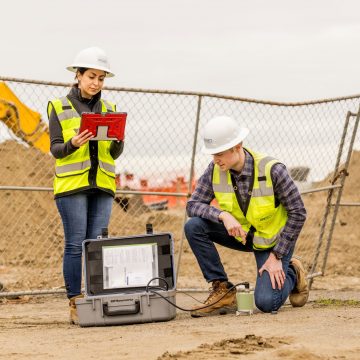The Interdisciplinary Approaches in the Geotechnical Market: Linking the Gap In Between Engineering, Geology, and Environmental Scientific Research for Optimum Task End Results
The combination of design, geology, and ecological science within the geotechnical sector is not just advantageous; it is necessary for attaining optimal job end results. What strategies might arise to facilitate this essential cooperation and improve the efficacy of geotechnical methods?
Value of Interdisciplinary Collaboration
The importance of interdisciplinary cooperation in the geotechnical market can not be overstated. Reliable geotechnical jobs call for the integration of diverse competence from various fields, including design, geology, and ecological science. This collaboration ensures that all elements of a job are taken into consideration, leading to detailed options that resolve complex difficulties.
When functioning in seclusion,Interdisciplinary collaboration fosters innovation by allowing experts to share understandings and methodologies that might not be apparent. By leveraging the strengths of numerous disciplines, teams can identify prospective threats, maximize design procedures, and boost the sustainability of geotechnical jobs. Such cooperation promotes an all natural understanding of site-specific conditions, which is crucial for exact assessment and decision-making.
The complexity of geotechnical tasks requires a collaborated strategy to analytic. Eventually, interdisciplinary collaboration is crucial for progressing best methods and achieving excellence in the geotechnical market.
Key Roles of Each Discipline
Collaboration among various self-controls is not simply helpful; it is crucial for the effective implementation of geotechnical jobs. Each self-control-- engineering, geology, and ecological scientific research-- plays an unique yet interconnected function that adds to forecast efficiency and sustainability.
Geotechnical engineers are mainly accountable for creating foundations and making sure structural honesty. They assess dirt and rock buildings to examine load-bearing capacities, offering essential data for secure building and construction techniques. Their experience makes it possible for the formula of ingenious remedies to complicated difficulties.

Environmental researchers examine the potential effects of construction on ecosystems and water sources. They conduct environmental assessments and develop mitigation strategies to reduce adverse impacts. By integrating eco-friendly factors to consider, they make sure compliance with guidelines and promote sustainability throughout the job lifecycle.
Study of Effective Combination
Effective integration of geotechnical techniques can be exhibited with different study that highlight the efficiency of teamwork in attending to complicated engineering obstacles. One significant example is the construction of the Hong Kong-- Zhuhai-- Macau Bridge, where a collective method involving geotechnical design, geology, and ecological science was crucial. Designers and rock hounds functioned in unison to assess the seabed conditions and optimize the structure layout, ensuring security and decreasing ecological influence.
An additional impactful case is the improvement of incline security in the San Francisco Bay Area, where an interdisciplinary team integrated geotechnical analysis with environmental evaluations. By incorporating geological surveys and hydrological researches, the group successfully determined potential landslide risks and applied reliable mitigation measures, boosting security and sustainability.
In addition, the redevelopment of Brownfield sites typically needs a multidisciplinary approach. In one situation in Chicago, partnership amongst geotechnical engineers, ecological researchers, and metropolitan organizers resulted in the successful removal of contaminated soil, enabling the safe transformation of the website into a neighborhood park. These case researches highlight that interdisciplinary cooperation not just addresses technical challenges however likewise promotes innovative services that benefit both neighborhoods and jobs.
Obstacles in Multidisciplinary Projects

Moreover, coordinating timetables and operations among different groups can be problematic, especially when each self-control has geotechnical engineers distinct job milestones and deliverables. This imbalance can cause delays and boosted prices. The difficulty of resource allocation also impends huge; guaranteeing that specific experience is available at crucial junctures requires careful preparation and foresight.
Last but not least, governing compliance postures an additional substantial difficulty. Each self-control may face various regulative structures, and lining up these needs to fulfill job objectives can be complicated and time-consuming. Addressing these obstacles demands solid leadership and reliable interaction strategies to foster partnership and make certain that multidisciplinary groups function cohesively in the direction of shared goals.
Future Trends in Geotechnical Practices
As the geotechnical market progresses, emerging trends are improving methods to attend to the obstacles encountered in multidisciplinary jobs - geotechnical engineers. One significant pattern is the enhanced assimilation of advanced technologies, such as expert system and artificial intelligence, right into geotechnical evaluation and layout. These innovations enhance anticipating modeling and danger assessment, allowing engineers to make even more educated decisions throughout the task lifecycle

Additionally, the adoption of digital twins and real-time monitoring systems is ending up being more common. These devices assist in ongoing assessment of soil problems and architectural efficiency, enabling for prompt treatments when problems emerge.
Final Thought
To conclude, the integration of engineering, geology, and environmental scientific research is vital for achieving optimal results in the geotechnical market. Interdisciplinary cooperation fosters development, improves problem-solving capacities, and straightens technological demands with environmental sustainability. Successful instance research studies highlight the advantages of this approach, while acknowledging the challenges dealt with in multidisciplinary jobs. Looking in advance, welcoming these collective practices will certainly be essential for browsing future fads and advancing the area of geotechnical engineering.
The combination of design, geology, and ecological scientific research within the geotechnical market is not simply advantageous; it is important for achieving optimal task results. Efficient geotechnical jobs call for the combination of varied proficiency from different fields, consisting of design, geology, and environmental science.Navigating the complexities of multidisciplinary projects in the geotechnical market presents several significant challenges.As the geotechnical industry develops, arising patterns are reshaping practices to attend to the challenges dealt with in multidisciplinary tasks. Geotechnical engineers are progressively collaborating with environmental researchers to make sure that jobs line up with sustainability goals and comply with governing needs.